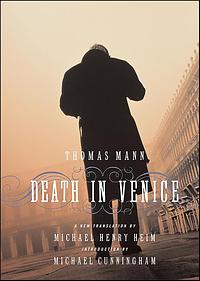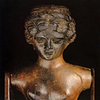Take a photo of a barcode or cover
Really wonderful prose. Extremely quotable and contemplative. Reminded me of Nabokov at times. The story chronicles the dangers of obsession as the protagonist stalks and admires a young boy from afar in a Venice struck by illness. The story and narration weave together to create a very thought provoking experience.
Is the protagonist's increasing obsession with his muse an experiential apotheosis of his life, or its shameful nadir?
This novel is full of the same metaphorical and descriptive richness which will culminate in the Magic Mountain. That the same dilemmas and their resolutions occurred to the classical and mythological authors as to those in 20th century Europe is a delightful theme also connecting the two works. The centrality of visions/dreams is no less important in this than in Mann's magnum opus; they are sparingly but forcefully employed. Only one author could have written either of them.
The novel touches on many questions fundamental to human existence: the necessity of beauty for art but also for human motivation and life; the proximity of genius to madness; the connection (or lack thereof) between knowledge and morality.
A tour de force delivered in so few pages is surely essential reading.
This novel is full of the same metaphorical and descriptive richness which will culminate in the Magic Mountain. That the same dilemmas and their resolutions occurred to the classical and mythological authors as to those in 20th century Europe is a delightful theme also connecting the two works. The centrality of visions/dreams is no less important in this than in Mann's magnum opus; they are sparingly but forcefully employed. Only one author could have written either of them.
The novel touches on many questions fundamental to human existence: the necessity of beauty for art but also for human motivation and life; the proximity of genius to madness; the connection (or lack thereof) between knowledge and morality.
A tour de force delivered in so few pages is surely essential reading.
I think I will refrain from rating it because I am still thinking about what the ultimate “message” of the book was. It seems like a reductive path to follow, but I do think there is something specific Mann wants to leave the reader with at the end. The book itself is about a writer, Von Aschenback and his long-term denial and repression of his emotional side which eventually leads him on this self destructive journey. The narrator’s inputs seem to be philosophical tirades meant to contextualise and frame Aschenback’s thoughts and actions. There is a duality inherent in these two perspectives juxtaposed together, but also in many of the objects he interacts with in the novella. I understand the exploration of what Freud what call the death drive, something like a call from the void or the abyss (in this case the latter) that haunts our psyche and makes us desire for things that may not be fundamentally good or have desirable outcomes. I think that is a worthy psychological exploration to take on. Mann spends some time talking about the Greeks and Eros, and erudition and his extreme repression of it. The point the book is making is ultimately complex, working to highlight the duality of the opposites and the irony of how they go together.
Full of profound observations about the human condition, but I couldn't get past the ickiness of the old-man-obsessed-with-sweet-young-thing storyline.
challenging
dark
reflective
slow-paced
Plot or Character Driven:
Character
Strong character development:
Yes
Loveable characters:
No
Diverse cast of characters:
No
Flaws of characters a main focus:
Yes
Der Tod in Venedig war mein erstes Werk von Thomas Mann. Es war eine Empfehlung, die ich uneingeschränkt weitergeben kann.
Gustav von Aschenbach ist ein Mann, der, bereits ergraut, einen zweiten Frühling in Venedig erlebt. Dort macht er Urlaub und sieht den jungen Tadzio, ein bildschöner Teenager, dem er verfällt.
Die Novelle beschreibt Aschenbachs innere Zerrissenheit zwischen seinem bisherigen, von Disziplin und Routinen geprägten Dasein, und der Leidenschaft die er in Venedig für diesen Jüngling empfindet.
Als die Cholera Venedig erreicht muss er sich entscheiden: Fliehen, sich selbst und die polnische Familie um Tadzio retten, oder bleiben, schweigen und sich der Leidenschaft hingeben.
Aschenbach bleibt - und stirbt.
Thomas Mann verarbeitet in dieser Novelle nicht nur seine eigene Venedigreise, sondern auch seine homoerotischen Gefühle. Viele Begebenheiten und Schauplätze sind authentisch - Tadzio eingeschlossen.
Mit Detailtreue vermag er es, Venedig und die Atmosphäre Anfang des 20. Jahrhunderts bildlich vor Augen zu führen. Die drückende Hitze, die engen Gassen, die kühlen Getränke, die feine Gesellschaft.
Und auch das Innenleben von Gustav von Aschenbach ist genau beschrieben: Sein Ärger über Unsittlichkeiten, seine Leidenschaft für Tadzio, seine Zerrissenheit, seine Verzweiflung.
Er bedient sich dabei nicht nur dem Offensichtlichen, sondern zwischen den Zeilen kann viel hinein- oder herausgelesen werden.
Dieser Aspekt hat mir besonders gut gefallen, da es sich immer gelohnt hat, über Szenen ein zweites Mal nachzudenken, zu verweilen. Diese Dichte der Erzählebenen macht Thomas Mann für mich zu einem der ganz großen Schriftsteller, die ich gerne weiterhin lese.
Die Novelle beschreibt Aschenbachs innere Zerrissenheit zwischen seinem bisherigen, von Disziplin und Routinen geprägten Dasein, und der Leidenschaft die er in Venedig für diesen Jüngling empfindet.
Als die Cholera Venedig erreicht muss er sich entscheiden: Fliehen, sich selbst und die polnische Familie um Tadzio retten, oder bleiben, schweigen und sich der Leidenschaft hingeben.
Aschenbach bleibt - und stirbt.
Thomas Mann verarbeitet in dieser Novelle nicht nur seine eigene Venedigreise, sondern auch seine homoerotischen Gefühle. Viele Begebenheiten und Schauplätze sind authentisch - Tadzio eingeschlossen.
Mit Detailtreue vermag er es, Venedig und die Atmosphäre Anfang des 20. Jahrhunderts bildlich vor Augen zu führen. Die drückende Hitze, die engen Gassen, die kühlen Getränke, die feine Gesellschaft.
Und auch das Innenleben von Gustav von Aschenbach ist genau beschrieben: Sein Ärger über Unsittlichkeiten, seine Leidenschaft für Tadzio, seine Zerrissenheit, seine Verzweiflung.
Er bedient sich dabei nicht nur dem Offensichtlichen, sondern zwischen den Zeilen kann viel hinein- oder herausgelesen werden.
Dieser Aspekt hat mir besonders gut gefallen, da es sich immer gelohnt hat, über Szenen ein zweites Mal nachzudenken, zu verweilen. Diese Dichte der Erzählebenen macht Thomas Mann für mich zu einem der ganz großen Schriftsteller, die ich gerne weiterhin lese.
emotional
medium-paced
Plot or Character Driven:
A mix
Strong character development:
No
Loveable characters:
No
Diverse cast of characters:
No
Flaws of characters a main focus:
No
dark
mysterious
tense
slow-paced
Plot or Character Driven:
Character
Strong character development:
No
Loveable characters:
No
Diverse cast of characters:
No
Flaws of characters a main focus:
Yes
Gustav von Aschenbach is a middle aged German writer who finds himself rather stuck in life. He takes a holiday in Venice, Italy. He finds himself stricken by the beauty of a 14 year old Polish boy named Tadzio, who is vacationing with his family at the same resort as Aschenbach. Aschenbach follows Tadzio continuously and eventually falls in love with him due to his looks and idealistic personality he crafts for the boy. Cholera breaks out and becomes an epidemic at the resort. People are forced to leave due to health concerns. Aschenbach refuses this deportation from the resort and finds himself worried for Tadzio. The writer perishes from the contracted illness in his desperation to find Tadzio again.
The book’s prose is not to be taken lightly. The wording and pacing is wonderful. On a first read and of initial thought, I believed this book to be somewhat similar to Lolita, where the story was meant to be taken satirically with messages interlaced between the absurdity of the characters. Of recent findings, I learned this book was semi-autobiographical. This puts things into different perspective for me and leaves a rather unpleasant and confusing impression. While on initial reaction, I had thought of the book highly. I still find myself looking fondly on the writing. I think the juxtaposition between Aschenbach’s dwindling life and perceived beauty with the promise and grace Tadzio holds was rather remarkable. The older gentleman infatuated by something he no longer had but yearned to have back. Tadzio’s unknowing of this; a reflection of his youth. The romantic aspect of this book, however, is rather unnerving and disagreeable. The once peculiar yet intriguing dynamic between Aschenbach and Tadzio grows quickly off putting and disturbing. Aschenbach is a very unlikable man with a much disturbing disposition.
While finding the writing most compelling, especially towards the end, I find myself wondering about Thomas Mann himself and how his writing reflects his true nature. Does that change the meaning of his story? I think to a greater capacity, yes. While Mann is no longer alive, there isn’t much to feel strongly about I suppose. I think the themes you can pull from Death In Venice is much well worth the read despite the original intent being rather disagreeable. The moral and physical death of Aschenbach is very interesting when looked at beyond face value. I don’t disagree with those who look upon this novel negatively, but I find it worthwhile and a rather interesting read. I rather enjoyed the book and still do, a year later.
The book’s prose is not to be taken lightly. The wording and pacing is wonderful. On a first read and of initial thought, I believed this book to be somewhat similar to Lolita, where the story was meant to be taken satirically with messages interlaced between the absurdity of the characters. Of recent findings, I learned this book was semi-autobiographical. This puts things into different perspective for me and leaves a rather unpleasant and confusing impression. While on initial reaction, I had thought of the book highly. I still find myself looking fondly on the writing. I think the juxtaposition between Aschenbach’s dwindling life and perceived beauty with the promise and grace Tadzio holds was rather remarkable. The older gentleman infatuated by something he no longer had but yearned to have back. Tadzio’s unknowing of this; a reflection of his youth. The romantic aspect of this book, however, is rather unnerving and disagreeable. The once peculiar yet intriguing dynamic between Aschenbach and Tadzio grows quickly off putting and disturbing. Aschenbach is a very unlikable man with a much disturbing disposition.
While finding the writing most compelling, especially towards the end, I find myself wondering about Thomas Mann himself and how his writing reflects his true nature. Does that change the meaning of his story? I think to a greater capacity, yes. While Mann is no longer alive, there isn’t much to feel strongly about I suppose. I think the themes you can pull from Death In Venice is much well worth the read despite the original intent being rather disagreeable. The moral and physical death of Aschenbach is very interesting when looked at beyond face value. I don’t disagree with those who look upon this novel negatively, but I find it worthwhile and a rather interesting read. I rather enjoyed the book and still do, a year later.
dark
reflective
medium-paced
Love this book. It gave me a lot of new words to look up and add to my personal dictionary.
dark
emotional
mysterious
reflective
slow-paced
Plot or Character Driven:
Character
Strong character development:
Complicated
Loveable characters:
No
Flaws of characters a main focus:
Yes






